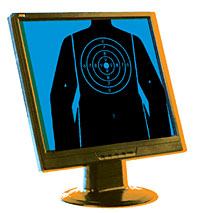
Hypochondria is the truest enemy of inner peace—I know that because I suffer from it. A severe to moderate case, I’d say. Lately, I’m less worried about disease and imminent death than premature bodily breakdown. At the age of 34, I can feel my eyes and knees giving out and suspect everything from ulcers to … worse. So when a friend, a fellow hypochondriac, told me about a longevity specialist who conducts Mayo Clinic–like testing of one’s health, I wondered if this person could save me from myself.
Dr. Eric Braverman’s practice, called PATH Medical (Place for Achieving Total Health), is, in fact, a hypochondriac’s candy store. He does full-body ultrasounds to measure the size and shape and surface of every organ, and uses something called a B.E.A.M. machine to assess the speed of your brain: You get a cap studded with electrodes put on your head and more electrodes clipped to your ears. That produces readings that are used to extrapolate your likelihood of obesity, depression, irregular sleep cycles, and seizures. There’s also a video game that you play while the effectiveness of your neurotransmitters is measured.
If all this sounds like something out of Young Frankenstein, it actually looks nothing like that. Braverman, an affable, gray-haired 49-year-old, doesn’t even wear a lab coat over his suit. At his office on Park Avenue South, we met in a room dubbed the “Lincoln Suite,” which looked like a hotel. When it came time for my ultrasound, I stood to leave, only to be told we were already in the exam room. As I lay on the examination table, I craned my neck to see what popped up on the black-and-white screen. All I could think about was, Hey, why doesn’t everyone get this done? And then I thought, Wait a minute, what is that? And that?!
After conducting a midsection ultrasound and a bone scan, Braverman had bad news for me. I have stage-one osteoporosis, a condition I had yet to worry about. Apparently, I have the bones of a 60-year-old, as well as a high percentage of body fat, mostly in my arms and legs, which I can’t blame on my 8-month-old twins for much longer. Not all that serious, I thought. But then Braverman started on about how excess weight can lead to diabetes, which can lead to blindness and circulatory issues, not to mention stress and increased cortisol levels, which have been linked to a weakened immune system and cancer. His recommended treatment includes supplements, and bioidentical hormones, including human growth hormone, which the American Medical Association has yet to endorse for use.
Finding out all this did not, at first, fill me with any inner peace. But it has helped harden my resolve to hit the gym. My hypochondria has not gone away, but at least now I can connect my free-floating fears to genuine causes of concern. As Braverman says, “We can’t cure a hypochondriac, but we can make a hypochondriac more productive.”